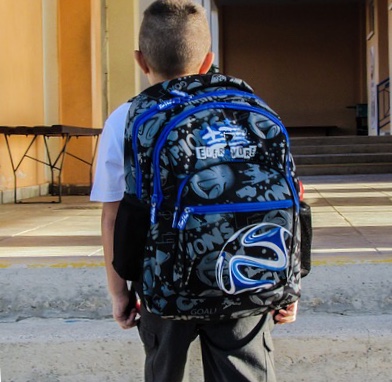Starting Secondary School is an exciting time, but it can also be an anxious time not only for the child, but also for the parents. When my eldest child started I remember worrying about whether I had bought everything required and checking the list over and over. I didn’t want him to be the one getting into trouble on day one for not having the right socks at PE! Having been through this process twice in recent years here’s my practical tips to get you through it…
You’re not alone:
- Find out if there is a Facebook group (or similar, other social media platforms) available for parents of children starting at your school. If not, why not start one? These can be an invaluable source of support and information, especially as there will be many parents who already have children at the school and can provide all the answers you need. It’s always a relief to see someone else asking the question you were wondering about too!
- If you know parents who already have children at the school talk to them and ask them any specific questions about the school.
- Make sure you go to any parent welcome meetings. This sounds obvious but busy lives mean diary clashes. I couldn’t make it to the meeting when my second child started Secondary school and I regretted it, even though I already knew most of what they were going to tell us. It’s worth it to meet some of the staff and the other parents, to put your mind at ease about the transfer process, the expectations of the school, and just having a sense of where your child is spending most of their day; and they may hand out important forms, or additional information on the night.
Buy big, buy spares, and label everything:
- Many schools will have designated suppliers for school-specific uniform items – blazers, PE kit, ties, maybe even skirts and jumpers. There’s not a lot you can do about that and the cost is what it is. But basic items like shirts, blouses, trousers, tights and socks can usually be bought anywhere, so whilst it can be tempting to just shop in one place and get it all done, you may be able to save on these standard items by shopping around at other High Street retailers.
- Buy big – seeing Year 7s in over-sized uniform at the start of the new year is part of the tradition and they are going to grow, in some cases very quickly, and you don’t want to be replacing that expensive blazer after 2 terms!
- I’d recommend buying lots of PE socks – they always seem to get lost, or only one of the pair comes home! And an extra tie (assuming a tie is part of the uniform) is handy just in case.
- I’d even go as far as saying an extra PE kit is handy – if your child’s items accidentally get picked up by someone else in the changing room (picture it… dozens of kids all trying to get changed as quickly as possible, items that all look the same dropping on the floor being left on benches, getting picked up by the wrong person…) it can be tricky to get them back quickly (or at all), especially if the other child isn’t known to yours… or theirs is the kit that doesn’t go home regularly for washing and so the error may not be discovered for a while! Multiple PE lessons/team training each week and no time to replace the missing item = tears at bedtime! I am speaking from experience here. I am one of many parents that has rushed out to the supplier next day to replace missing kit (I’m pleased to say most of it has turned up in the end, except that one rugby boot… we still don’t know what happened to that!) And judging from the messages on our year group parent’s Facebook group, lost kit is a very common occurrence!
- If you’re feeling weak at the thought of all this expense don’t worry. Most schools will hold second-hand uniform and equipment sales a couple of times a year and one is usually timed for new starters. They can be very popular though so get there early to have the best chance of getting the items you need. Even if you want to send your child off on day one with brand new uniform it’s a good place to pick up those spares. Schools usually also have access to funds and grants to assist those from whom purchasing uniform and equipment is a struggle.
- For purchasing any school-specific items, if the designated supplier has a shop, call and check if you can make an appointment to come in and buy what you need. It can get busy in the run up to September and booking an appointment should mean you have a dedicated member of staff who can help you. They will know the specific requirements of the school and be able to advise on size (buy big, have I mentioned that already?!) and regulations like skirt length for example.
- Label everything! Yes, unfortunately this is one thing that doesn’t change from primary school, and in fact is even more important if you want to avoid too much going missing and to have any chance of getting your lost property back. With hundreds of pupils at secondary school, a lot of places for things to get lost, and lots more items to lose, if it’s not labelled the chances of ever getting it back are slim (see earlier re missing PE Kit) and you are relying on your child to find their own lost items now! Don’t forget shoes – I’ve seen posts from parents whose children manage to come home with odd shoes!
- It’s worth talking to someone with children at the school already to find out if they really need EVERYTHING on the (no-doubt) massive equipment list you’ve been given. I’ve realised that there were few bit and pieces that we really didn’t need to buy. Also find out about things that aren’t on the list that could be useful!
- Label everything! (Am I repeating myself again?) It’s not just uniform – don’t forget equipment too! If there’s a standard set of items that everyone is going to have then they will get mixed up. And after the initial few weeks (days?) when people start forgetting/losing bits and pieces your child might be the kind and generous one that lends things to others… but they might also be the one that is too forgetful/polite to ask for it back at the end of the lesson. There’s nothing worse when you’re in Year 7 than sitting down to do that Maths homework on angles only to discover you don’t have your protractor… (knowing that Mr or Mrs Strict-Teacher won’t accept that as a good enough excuse = more tears at bedtime).
- Any items that don’t need to be standard or school-branded – perhaps bags, PE bags, pencil cases etc I would recommend buying something distinctive, so they can be easily identified on sight and avoid mix-up.
- Buy a big cheap multi-pack of pens and pencils. They will go through loads (see loaned/lost items above!)
Organisation is key:
- Before they start, if they will be walking to school, it’s worth walking the route with them one day so they know exactly where they are going, work out the best (and safest) route and to time it so they know exactly when they need to be leaving the house in the morning. Remember to walk at their pace, not yours, and factor in that they may be carrying a heavy bag (or two) some days so that may slow them down a bit.
- Help them get organised in the early days. Yes, they need to stand on their own two feet, but it’s so overwhelming in the first few weeks that a bit of encouragement and pointing them in the right direction to organise themselves each evening – checking their timetable, packing what they need in their bags, ensuring they have any special pieces of equipment, money, house keys, phone (like they’d forget that!) – isn’t going to mean they rely on you for ever. Just don’t do it for them!
- Using plastic wallets (the envelope style with the popper on the front) to hold workbooks, textbooks and loose sheets for each subject can help. Encourage them to label each folder with the subject name and when they pack their bag they just pick up the right folder. Any homework can be stored in the folder when they are finished so it doesn’t get lost or forgotten. As well as being organised it means the books and sheets don’t get tatty in their bags!
- Take photocopies of their timetable so you can have spares at home in case one gets lost. It’s also useful to pin one up in their room and encourage them to annotate which equipment that they need to bring for each lesson.
- If your school operates a cashless system don’t forget to load up their account before they start. No-one wants to miss lunch on the first day! Even if they are taking packed lunch, it’s worth having money on the account for the day they run out of the house in a hurry and forget their lunch.
- Help them develop good habits around homework. For some, this can be the biggest challenge moving up from primary school. Getting into the habit to doing it right away or planning it around other activities in the early days can make life so much easier later.
And finally…
Don’t ask too many questions! When they come home in the first few days and weeks you will be dying to know every detail – how did they get on, did they find their way around, how are their teachers, who are they friends with, what did they do at break/lunchtime, what subjects did they have…? Hold fire! Every child is different and yours may be the chatty type that wants to relay every bit of detail as soon as they walk through the door – lucky you – but most will be tired and have so much to process themselves that they can’t cope with being bombarded by questions right away. It will all come out in time… their time.
Good luck! Once you’re half-a-term in you’ll be wondering what you were worrying about. And of course, there comes a point when you’ve done all you can, and they have to take responsibility and face any consequences for losing kit (especially when it’s the spare) or not getting homework done (they won’t be lending that protractor out again) and learn from them!
One last piece of advice for you though… don’t forget to take lots of tissues to whatever event your primary school puts on to mark their moving on. It will be emotional!









 Browse the site
Browse the site






